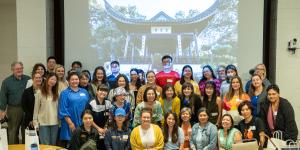On September 29, 2024, the USC U.S.-China Institute hosted a workshop at the Huntington’s Chinese garden, offering K-12 educators hands-on insights into using the garden as a teaching tool. With expert presentations, a guided tour, and new resources, the event explored how Chinese gardens' rich history and cultural significance can be integrated into classrooms. Interested in learning more? Click below for details on the workshop and upcoming programs for educators.
Documents - US-China
The Art of China Watching
Document was declassified and made public in the mid 1990s.
Henry Kissinger and Mao Zedong "Memorandum of Conversation," November 12, 1973, 5:40-8:25pm
Henry Kissinger, U.S. Secretary of State, spoke with Chinese leaders at Chairman Mao's residence in Beijing.
Henry Kissinger and Mao Zedong "Memorandum of Conversation," February 17-18, 1973, 11:30pm-1:20am
Henry Kissinger, Assistant to the President for National Security Affairs, spoke with Chinese leaders at Chairman Mao's residence in Beijing.
Hale Boggs and Gerald Ford, "Impressions of the New China: Joint Report to the U.S. House of Representatives," August 3, 1972
Boggs (Democrat) was the Majority Leader of the US House of Representatives and Ford (Republican) was the Minority Leader of the House. They visited China from June 23 to July 7, 1972. A House resolution on August 3, 1972 authorized the printing of their report as a House document.
Hale Boggs and Gerald Ford, "Private Report to President Nixon," July 20, 1972
Boggs (Dem.) and Ford (Rep.) lead a delegation to China June 23 to July 7, 1972.
Winston Lord, Mike Mansfield, and Hugh Scott, "Report on Mansfield - Scott Trip to China," May 12, 1972
Mansfield (D-Montana), the Senate Majority Leader, and Hugh Scott (R-Pennsylvania), the Seante Minority Leader, visited China between April 19-22, 1972. They subsequently prepared a report on the trip for President Richard Nixon.
Richard Nixon, Remarks upon Returning from China, Feb. 28, 1972
Remarks made by President Richard Nixon after his trip to the People's Republic of China.
Nixon in China Itinerary, Feb. 17 -28, 1972
Outline of President Richard Nixon's historic trip to China. Excerpted from "Weekly Compilation of Presidential Documents," February 28, 1972.
Richard Nixon and Zhang Chunqiao, Toasts at Shanghai Banquet, February 27, 1972
Toast at the end of the President's historic trip. Followed the signing of the Shanghai Communiqué
Joint Communiqué of the United States of America and the People's Republic of China, February 27, 1972 (Shanghai Communiqué)
President Richard Nixon of the United States of America visited the People's Republic of China at the invitation of Premier Zhou Enlai of the People's Republic of China from February 21 to February 28, 1972. The Shanghai Communiqué was the first US-China joint statement outlining the basis of the relationship between the great powers.
Pages
Featured Articles
Happy Lunar New Year from the USC US-China Institute!
Events
Ying Zhu looks at new developments for Chinese and global streaming services.
David Zweig examines China's talent recruitment efforts, particularly towards those scientists and engineers who left China for further study. U.S. universities, labs and companies have long brought in talent from China. Are such people still welcome?






